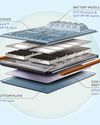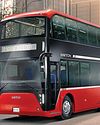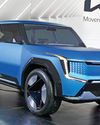
Tata Motors has seen a notable increase in CNG sales for its intermediate, LCV and SCV vehicle portfolios in fiscal 2022 as compared to fiscal 2021, says executive director, Tata Motors, Girish Wagh.
In an e-mail interview to Autocar Professional, Wagh said the trends suggest a shift in CV buying as far as fuel mix preference goes from diesel to CNG-powered vehicle. He attributed this to a trio of factors. Firstly, the increasing diesel prices have increased the total cost of operations for fleet owners thereby impacting overall profitability compared to CNG-powered vehicles. Secondly, the initial price difference between similar diesel-powered and CNG-powered vehicles has reduced after the transition to BS6 emission norms. Lastly, CNG is now more widely available in metros, tier 2 and tier 3 cities thus taking away the range anxiety to a large extent and boosting demand. Besides the savings on operational costs, CNG vehicles have also resulted cost benefits, with exemptions on green tax/cess in numerous states and cities across the country, Wagh emphasised. With a strong portfolio of CNG vehicles in the SCV, I&LCV and the bus range, the company has been able to leverage this.
This story is from the {{IssueName}} edition of {{MagazineName}}.
Start your 7-day Magzter GOLD free trial to access thousands of curated premium stories, and 9,000+ magazines and newspapers.
Already a subscriber ? Sign In
This story is from the {{IssueName}} edition of {{MagazineName}}.
Start your 7-day Magzter GOLD free trial to access thousands of curated premium stories, and 9,000+ magazines and newspapers.
Already a subscriber? Sign In

Spain's Fersa Group invests in India-based Delux Bearings
Besides theRs100 croreinvestment, the Indian company gets access toadvanced technologies and bearings with arange of applications that willhelpinits global growth strategy, writes Manobhava Baruah.

Tata Autocomp to open compact dual-clutch transmission plant
Amidthe country’s growing need for personal mobility with easy manoeuvrability, comes the demand for vehicles with automatic transmission. Tata AutoCompisready tomovein writes Shruti Mishra.

Pankaj Munjal-backed Hero Motors raises equity from GEF Cap
The company willinvest Rs1,500 crore over thenextthree years andit expects 60 percent ofits turnover to come fromelectric vehicle parts. Itaims to becomea Global EV Solutions Company from India

New age thermoplastics for next-generation EV batteries
Saudi-based global materials major SABIChas developed cutting edgein fire-resistant polymers and flame-retardant materials that comply with various EV battery safety standards across the world.

Switch Mobility to meet growing e-bus demand with fresh capex
Oncourse for abillion-dollar business, the company is exploringa possibility of operating satellite factories across the country to serve different geographies, write ShahkarAbidi and Ketan Thakkar.

Kia India to invest Rs 2,000 crore in EVS, to introduce new e-RV in 2025
New investmentto drive R&D, infrastructure development and manufacturing capabilities. The company willlocally produce EVsin India with possibility of exports as well, writes Mayank Dhingra.

"The government has given enough time for indigenisation but the industry has not taken it seriously"
Amitabh Saran, Founder and CEO, Altigreen, shares his views on problems inthe EV industry and battery localisation solutions with Amit Vijay M.

TATA MOTORS SEES ONE INTWO CARS SOLDAS EVS BY 2030
The company aims to offer wider choices withnew EVs that may straddle a pricebracket of Rs20to 40lakhinthe coming years, writes Ketan Thakkar.

MG Motor India in expansion drive, to invest $100 million
The investment willbe usedtoramp up existing production capacity from1.2to1.4-15lakh units per annum atthe automaker's Halol plantin Gujarat, writes Ketan Thakkar.

"Technology and its multiplier effect are driving business transformations and customer experiences"
Technical Centre India is one of Continental’s largest research and development centres in the world, andasa Centre of Competence’ it also develops customised products for the BRIC countries.